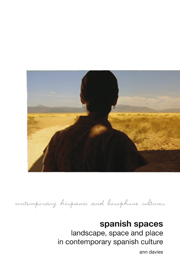Book contents
- Frontmatter
- Contents
- Acknowledgements
- List of illustrations
- 1 Introduction
- 2 Memory: landscapes of the past in Guillermo del Toro's Spanish films
- 3 Forgetting: the landscapes of Gonzalo Torrente Ballester
- 4 Landscape and identities in the Basque Country
- 5 Crime scene: landscape and the law of the land
- 6 Crime, scene, investigation: women, detection and the city
- 7 Coasting: tourism and landscape
- 8 Immigration: north (of) Africa
- 9 Conclusion
- Filmography
- Bibliography
- Index
3 - Forgetting: the landscapes of Gonzalo Torrente Ballester
- Frontmatter
- Contents
- Acknowledgements
- List of illustrations
- 1 Introduction
- 2 Memory: landscapes of the past in Guillermo del Toro's Spanish films
- 3 Forgetting: the landscapes of Gonzalo Torrente Ballester
- 4 Landscape and identities in the Basque Country
- 5 Crime scene: landscape and the law of the land
- 6 Crime, scene, investigation: women, detection and the city
- 7 Coasting: tourism and landscape
- 8 Immigration: north (of) Africa
- 9 Conclusion
- Filmography
- Bibliography
- Index
Summary
In Gonzalo Torrente Ballester's novel Yo no soy yo, evidentemente (I Am Clearly Not Myself), a German character makes the following remark:
Sobre este mundo real … hemos montado otro imaginario para nosotros mismos, un mundo que no nos engaña, pero que nos divierte y en el fondo nos satisface: La Alemania como debió ser, un país y una sociedad en la que tendríamos cabida. Quizás vaya en ello un poco de nostalgia de lo que se perdió para siempre. (Torrente Ballester 2008: 421–2)
We have erected for ourselves on top of this world another imaginary one, a world of which we have no illusions but which amuses us and deep down satisfies us: Germany as it ought to have been, a country and a society which would have had room for us. There is in that, perhaps, a little nostalgia for what was lost for ever.
This quotation from one of Torrente's later novels encapsulates much of what I am going to discuss in this chapter, focusing on Torrente's use of landscape, space and place in his work as a way of expressing the desire of association with a Spain that he wishes were otherwise. As with the previous chapter, we find a suggestion of Spain and its history as it ought to have been – history and memory as malleable fantasy – but now seen from the other side, the side of those who were the victors of the Civil War. Landscape, space and place become a means of wishing away past historical allegiances in favour of an imaginary land – but linked to the real one – where one fits in.
- Type
- Chapter
- Information
- Spanish SpacesLandscape, Space and Place in Contemporary Spanish Culture, pp. 40 - 59Publisher: Liverpool University PressPrint publication year: 2012

